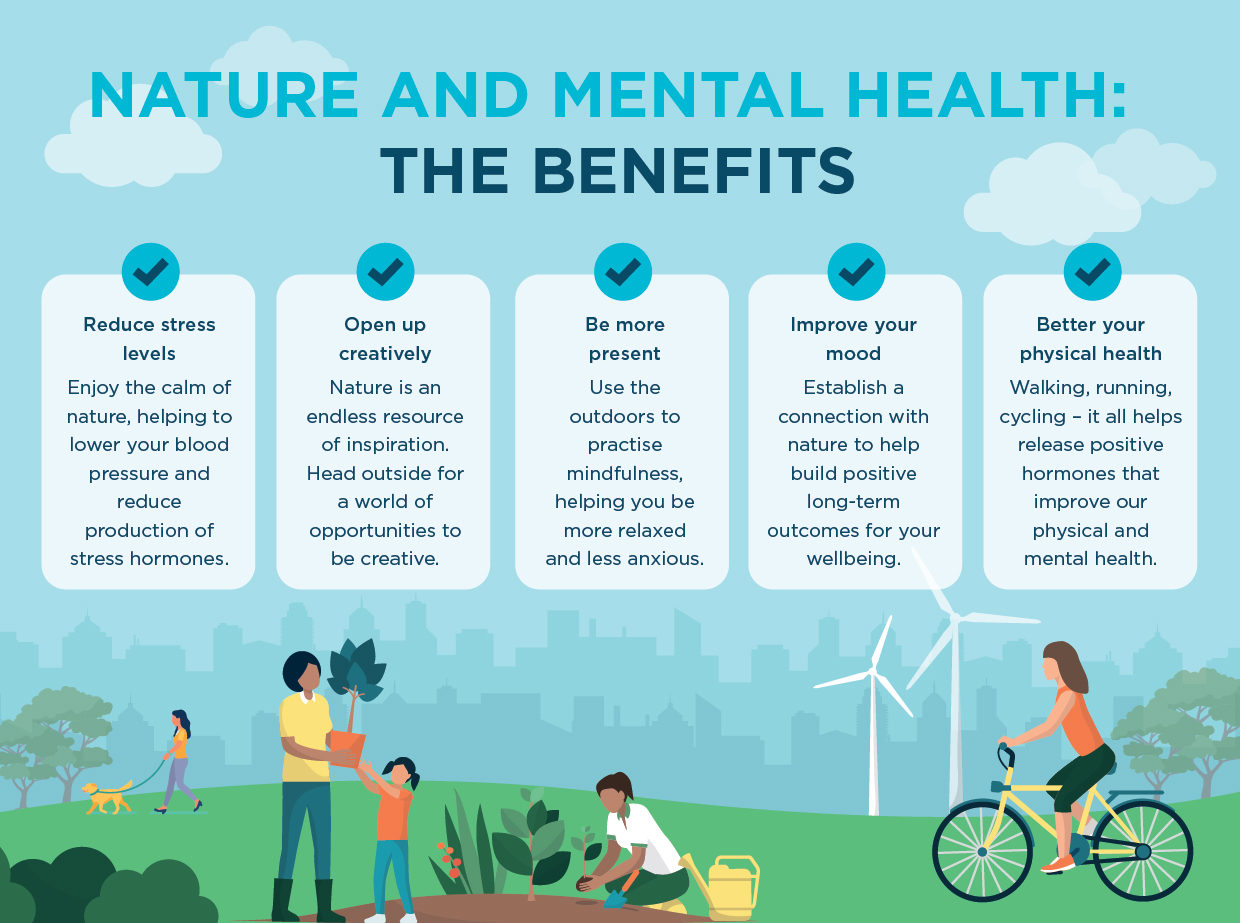Nature and mental health: the benefits of the great outdoors
How spending time in nature, or enjoying some time outside, can benefit your mental health.
Modern life sees many of us committing a lot of time to typing on our laptops, sitting in big office spaces or scrolling through our phones looking for something to catch our attention. This can all lead to us spending more time indoors and less time outdoors.
However, there's an increasing amount of evidence that suggest your connection with nature could bring a whole host of benefits to your psychological and physical health. In this article, we explore the benefits of the outdoors on our mental health an offer some suggestions for maximising those benefits.
An example of the benefits of nature on your mental health comes from a study of 20,000 people, led by the European Centre for Environment & Human Health. It found that people who spent 2 hours a week in green spaces were substantially more likely to report good health and improved psychological wellbeing vs. those that didn’t.
Spend some time outdoors, and you’re likely to notice some of the following benefits:

There's a growing body of research, such as this study in the International Journal of Environmental Research and Public Health, that shows how interacting with nature can lead to a range of positive stress-related benefits. The calming effects of nature, offering respite from our everyday worries, helps to lower our blood pressure and reduce the production of stress hormones.
On top of a reduction in stress, being more in touch with nature helps to reduce feelings of anxiety and improves our self-esteem. There's even evidence that shows that contact with nature reduces your levels of loneliness. This is in direct contrast to how we respond to being in busy, overcrowded cities – which, as the research suggests – can make us feel lonely. If you do live in a busy city, heading to your local park or getting out to the countryside can be vital to maintaining good mental health.
Being outside can also help reduce symptoms of seasonal affective disorder (SAD), a type of depression that typically occurs during colder, darker months. The greater exposure to natural light that you get when you’re outdoors, in nature, can help to improve your mood and help you feel better.
The outdoors is the perfect place to escape the high octane nature of modern life and just slow down. Relaxation techniques like mindfulness or visualisation can help to reduce your anxiety and relax a little more.
One effective method that would perfectly suit the outdoors is the 5,4,3,2,1 grounding technique. Name:
This method helps you to focus on your senses and be more present in the moment. The sights and sounds of nature are perfect for this kind of technique.
It’s well established that, even in small amounts, physical activity can have a profound effect on your health – both mental and physical. Exercising releases all the right hormones for reducing stress, gives us more energy and helps to improve our mood. Exercising is also one of the most effective self-help techniques for reducing depression and other mental health problems.
There's no better place to exercise than outdoors or with nature. The space, clean air and tranquil surroundings of your local park or nature reserve can help maximise these benefits.
Nature and the outdoors are an endless creative resource. Woodlands, forests, parks, lakes and wildlife offer an incredible amount of inspiration for doing something creative. It might also help you to make that connection with nature, bringing many of the benefits explored here.
For people with children, it’s the perfect tool for getting them involved too. Not only can you use nature to get them away from computer screens and remain active, it helps establish a vital early connection with nature. A study in the Frontiers in Psychology journal found that adolescents who consider a connection with nature to be important had better psychological wellbeing than those who didn’t.
There are countless things you can do to increase your exposure to nature and the great outdoors. Try a few of these out and see what works for you:
Oxygen is the lifeblood we all need for our bodies to function. Fresh, outdoor air generally has higher levels of oxygen than indoor air – as well as containing less harmful pollution.
Oxygen is fundamental to how your body operates. From brain functionality, energy levels, the immune system, digestion and lots more in between – it all relies on oxygen pumping through our system. If you’re getting better air quality with higher levels of oxygen, it'll help your body to function better.
It also encourages you to breathe more effectively. Sitting down indoors, we tend to breathe shallowly, only inhaling into the top part of our lungs. While standing up and moving outside, we’re able to breathe from deeper within our diaphragm, taking in more oxygen. Being outside is often the best place to practise some breathing exercises, like diaphragmatic breathing – which can be a good way of reducing stress and anxiety.